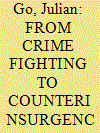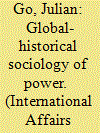|
|
|
Sort Order |
|
|
|
Items / Page
|
|
|
|
|
|
|
| Srl | Item |
| 1 |
ID:
155151


|
|
|
|
|
| Summary/Abstract |
This article reviews Andrew Linklater’s Violence and Civilization in the Western States-Systems. Focusing upon the book’s explanation of the ‘European civilizing process’ in the modern era, it suggests that the account is limited by ‘civilizational isolationism’ and ‘metrocentric diffusion’. These analytic operations serve to minimise the agency and contributions of non-Western, colonial, and postcolonial actors to the global civilizing process. The occlusion of such agency and contributions, however, are not specific to this work, but reflect broader limitations in historical sociology writ large.
|
|
|
|
|
|
|
|
|
|
|
|
|
|
|
|
| 2 |
ID:
185071


|
|
|
|
|
| Summary/Abstract |
The Special Patrol Group (SPG) of the London Metropolitan Police was formed as a crime-fighting unit in 1965. Beginning in the early 1970s, however, it underwent a transformation of ‘colonial counterinsurgenization’. The SPG shifted its initial role and increasingly took on the characteristics of a colonial counterinsurgency police force operating in the metropolis. The change is seen in the SPG’s approach to public order policing and crime prevention, especially in London’s African-Caribbean communities. The new counterinsurgency tactics of the SPG in those communities in turn generated the conditions for the very sorts of metropolitan uprisings the SPG had sought to subdue.
|
|
|
|
|
|
|
|
|
|
|
|
|
|
|
|
| 3 |
ID:
124763


|
|
|
|
|
| Publication |
2013.
|
| Summary/Abstract |
Michael Mann's long-anticipated volumes, the sources of social power, volume 3: global empires and revolution, 1890-1945 and the sources of social power, volume 4: globalizations, 1945-2011 complete Mann's career-spanning project. Compared to previous volumes in the series, these works are much more global in scope. They address topics such as global wars, empires, social citizenship across the industrialized world, economic recessions and climate change. In this way they rectify omissions in Mann's previous work, even while continuing to deploy Mann's previous IEMP (ideological, economic, social, political) model of power. However, three shortcomings remain: first, the books do not adequately deploy the concept of society as power networks; second, they do not offer a conceptualization of global systems or dynamics beyond the sum total of actions by individual states or actors; and third, they retain the standpoint of power in their analyses. Despite these shortcomings, these volumes offer a masterful global history of power over the past century and a half and make long-lasting contributions to the historical sociology of power.
|
|
|
|
|
|
|
|
|
|
|
|
|
|
|
|
| 4 |
ID:
145969


|
|
|
|
|
| Summary/Abstract |
Patricia Owens’s remarkable Economy of Force (2015) traces the counterinsurgency strategies used by the British and US empires from Malaya to Afghanistan. If this were all the book was about, though, it would not be so remarkable. What makes it remarkable is that, more than a history of postwar counterinsurgencies, Economy of Force directs our attention to two deeper relationships that have gone unnoticed in existing scholarship. The first is the relationship between counterinsurgency campaigns and uniquely social modes of thought. Counterinsurgency campaigns deployed social theory both to explain why insurgents rebelled and in their efforts to prevent it.
|
|
|
|
|
|
|
|
|
|
|
|
|
|
|
|
|
|
|
|
|